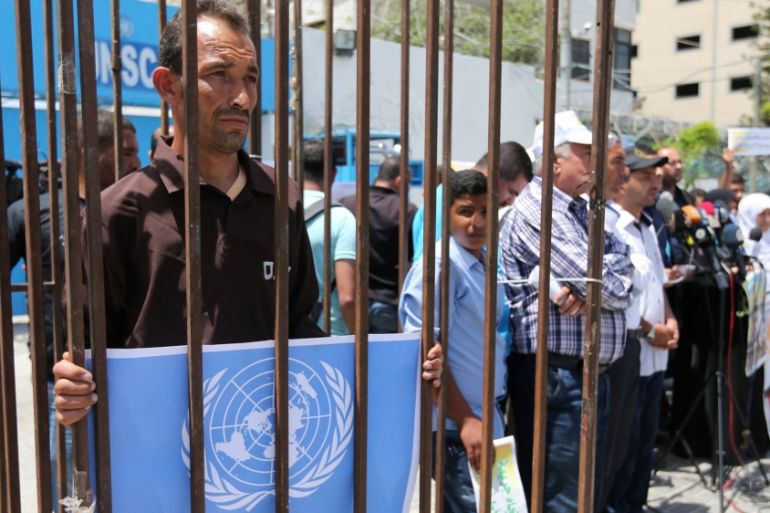Administrative detention ‘worst of all possible worlds’
Critics have blasted Israel’s practice of holding Palestinians on secret evidence, without charge or trial.

At first glance, a legislator, a circus performer and an NGO worker might not appear to have much in common. But all three Palestinians are former or current political prisoners who have been subjected to an obscure legal procedure called administrative detention, which allows Israel to imprison people without charge or trial for an indefinite amount of time.
Israeli authorities have been using this procedure for more than half a century, basing it on secret evidence. The Palestinian Prisoners Society, a detainee support group, noted a sharp rise in administrative detentions in August, with more Palestinians held without trial than during any other month this year. The rise, to 84 detentions, came amid increased tensions in the occupied West Bank after the stabbing of three Israeli settlers by a Palestinian on July 21.
As of September, there were 449 administrative detainees being held in prisons inside Israel, almost all of them Palestinian, according to data provided to rights group Hamoked by the Israel Prison Service.
“Administrative detention is the worst of all possible worlds because all the evidence is secret,” Sari Bashi, the Israel/Palestine advocacy director at Human Rights Watch, told Al Jazeera. “We would expect administrative detention to be the rarest as opposed to being standard practice. There are about 500 people in administrative detention. That’s not an exceptional number.”
READ MORE: Israeli prison ‘like being inside a grave’
Human rights activist Salah Hamouri, a Palestinian-French dual citizen, was among those arrested in August in a predawn raid at his home in the occupied East Jerusalem neighbourhood of Kufr Aqab. No reason was given for the arrest, his family said.
Hamouri, 32, was previously released in the 2011 Gilad Shalit prisoner exchange deal between Hamas and Israel, after spending seven years in prison. The deal was also backed by France. Israel alleged that Hamouri was part of a plot hatched by the Popular Front for the Liberation of Palestine (PFLP) to assassinate Ovadia Yosef, the founder of the ultraorthodox Shas party, who routinely incited against Palestinians.
Hamouri was taken to al-Muskubyeh (the so-called Russian Compound) interrogation centre in Jerusalem, where he was held for several days without access to a lawyer. He was later told he was in violation of his parole and that he would have to serve out the remainder of his sentence from 2005, which was three months.

His wife, Elsa Lefort, said the Israeli prosecution appealed this decision, asking to hold him indefinitely, and the court sentenced him to six months in administrative detention.
“The Israelis broke their deal with Hamas, but also with the French government,” Lefort told Al Jazeera from France, where she has been living since Israel banned her from Jerusalem for 10 years in 2016. “I was pregnant at the time [when I was denied entry to Jerusalem]. I had come in to see Salah and I was placed in detention for three days. The court was told I was a ‘danger’ to Israel. I was deported and my son was born in France. He’s never been to Palestine.”
Hamouri’s case has attracted the attention of French politicians and international human rights groups. “Hamouri has been a vocal advocate for Palestinian rights. We cannot allow for his voice to be silenced,” Patrick Le Hyaric, a French member of the European Parliament, told fellow legislators during a recent session.
Amnesty International has also spoken out against Hamouri’s detention, calling it “arbitrary”.
“For the last 50 years, Israeli authorities have been using administrative detention as a substitute for criminal proceedings in cases where there’s not enough evidence, to target different people,” Magdalena Mughrabi, the group’s deputy director for the Middle East and North Africa, told Al Jazeera. “We do believe that some of the people in administrative detention could be potentially prisoners of conscience or targeted for exercising their right to speak.”
READ MORE: Palestinian circus performer jailed ‘for no reason’
Many activists, journalists and political figures who challenge Israel’s military rule have found themselves in administrative detention. That has included several people affiliated with the PFLP, a political party that Israel deems a “terrorist” group.
“People can be detained indefinitely and it’s hard to find rhyme or reason for who authorities place in administrative detention,” Bashi said. “Israeli authorities accuse many people of activism in groups that they consider illegal, including PFLP and Hamas. Part of the problem is we don’t know the reasons.”
Khitam al-Saafin, chairwoman of the Union of Palestinian Women’s Committee, was recently released from administrative detention after being held for three months. She was arrested on July 2 in Beitunia, near Ramallah, on the same day as politician Khalida Jarrar. The Israeli army said at the time that both women were detained for their leading roles in the PFLP. Jarrar remains in detention.
Meanwhile, Palestinian circus trainer and tightrope walker Mohammed Abu Sakha, 26, was released this summer after spending two years in administrative detention, accused of being active in the PFLP.
While in prison, Abu Sakha joined a mass hunger strike that lasted more than 40 days to protest open-ended incarceration and demand better prison conditions. His case caught the attention of European diplomats in Jerusalem, who voiced concerns about Israel’s “extensive use” of administrative detention and said that detainees should “be informed about the charges underlying any detention, must be granted access to legal assistance, and be subject to a fair trial”.
In the coming weeks, Lefort hopes the French government will lobby Israel on her husband’s behalf and work to secure his release, as it did in the case of French reporter Loup Bureau, who was recently imprisoned in Turkey on “terror” charges. “We are asking for the same treatment. Just because Salah’s in a jail in Israel doesn’t mean he can’t be afforded the same treatment.”